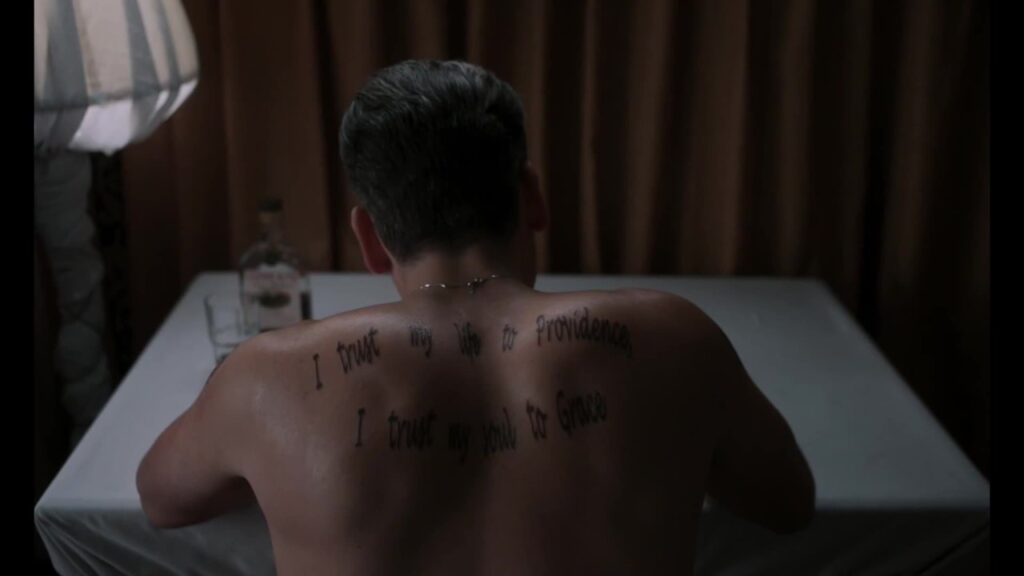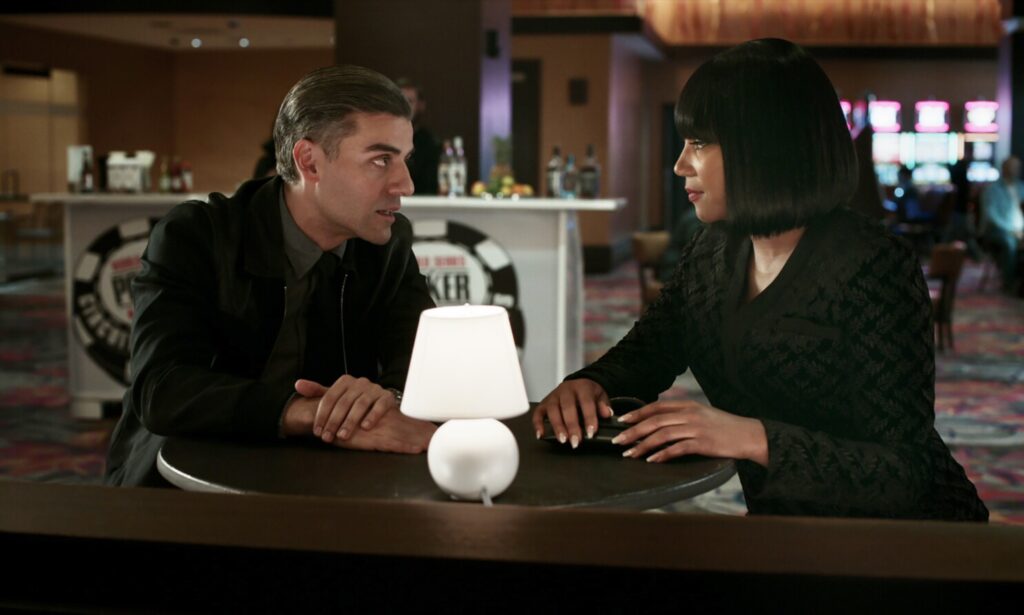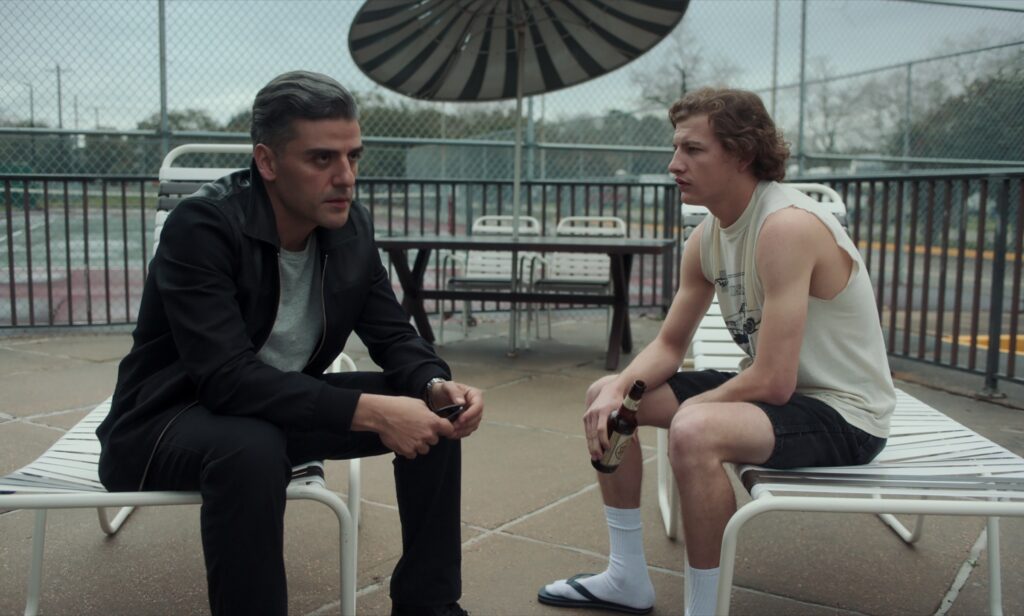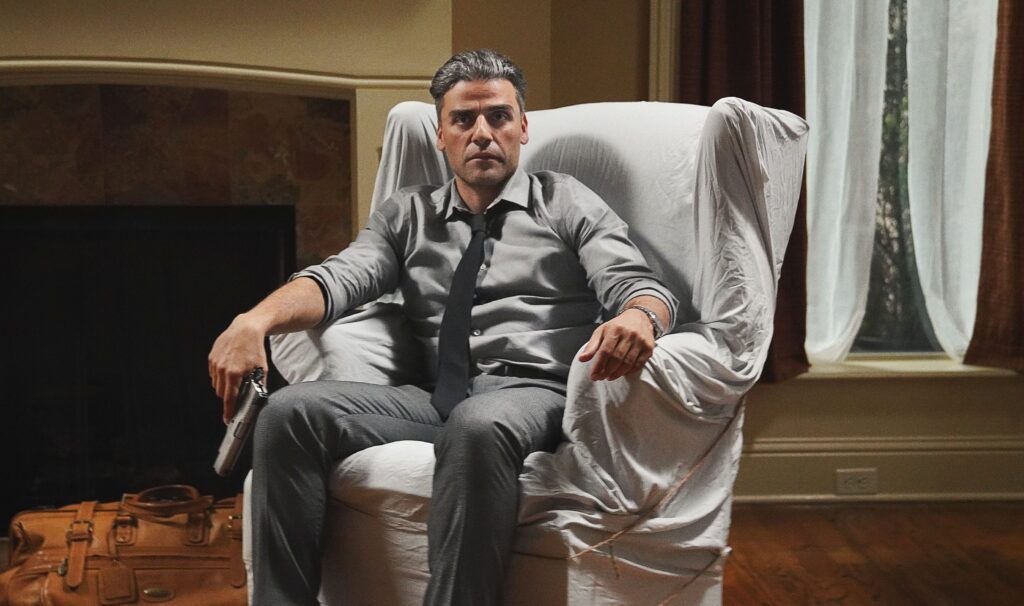Prior to the release in 1976 of Martin Scorsese’s Taxi Driver, based on Paul Schrader’s screenplay, the popular image in movies of taxi drivers were of amiable but somewhat chatty folk — prone to waffle on about the weather, politics or state of world affairs, while passengers did their best impression of accommodating politeness. In its portrayal of a tortured loner, stalking the seedy New York streets while barely concealed demons fuel his rage-filled internal monologue, Schrader forever changed the way we viewed those who take up, what is admittedly, a fairly monotonous and solitary profession.
In his new film, The Card Counter, Schrader once again turns to his ‘God’s lonely man’ motif first seen in Taxi Driver, and subsequently examined in much of his directorial output including American Gigolo (1980), Light Sleeper (1992) and First Reformed (2017).
This time the lonely man is William Tell (Oscar Isaacs), a disgraced former American soldier imprisoned for torture crimes committed at Abu Ghraib who, following release, spends his days playing low-risk poker and blackjack in small off the grid casinos across the country.
The “modest goal” nature of his gambling is necessary as he’s a known card counter, having spent the 8 years of incarceration at Leavenworth military prison honing his memory skills. It seems that casinos don’t mind card counters who win, but they do mind card counters who win big, and so Tell stays under the radar, playing, winning, moving on (or being moved on) in an endless cycle of repetitive routine to, as he says, “pass the time”.
As with other Schrader protagonists, Tell is a tortured soul beset by guilt he can’t shake, and which makes him an isolated, ghost-like figure even in a crowd.
He moves from city to city, staying in cheap motel rooms (the first we see, room 101, nods to the torture chamber from George Orwell’s Nineteen Eighty-Four) to avoid the noise and bluster of casino hotels, carrying with him a suitcase full of sheets which he uses to carefully cover all of the room’s furniture in a strange act of ritual erasure.
This is a man looking to make no impression and to leave no visible trace.
He spends his nights, often naked, scribbling thoughts into a notebook (another trademark Schrader image) in an effort to both understand his predicament, and as a form of tormented confessional.

“Is there an end to punishment? Is it possible to know when one has reached the limit?”
This self-made purgatory where he isn’t really living but doesn’t have the courage to kill himself is what Schrader has described in interviews as “the loner waiting for something to happen; just waiting to make a human connection”.
Poker is an apt metaphor for this waiting as it’s a card game that can be played for hours without anything significant happening until something actually does; usually a series of dealt hands that ramp up the tension and pit savvy players against each other in a battle of wills.
The world of The Card Counter however is Tell’s world, and so all of the glamour and shine of casino gambling is stripped bare, leaving us with a sparse, functional series of spaces for his limbo to play itself out. These are the ubiquitous conference hall ‘card rooms’ with poor lighting, cheap felt-lined chairs and endless rounds of stale coffee that attract drifters and dreamers like hungry moths to an addictive flame.

Into this world of waiting come two people that will provide Tell with both the human contact he craves and a possible shot at salvation.
La Linda (Tiffany Haddish) is a charismatic gambling financier that observes Tell’s potential and so propositions him to accept sponsored backing which will enable them both to reap lucrative rewards. Cirk (Tye Sheridan) is the young man intent on revenge, who meets Tell at a casino security convention and asks if he’ll help him kill Major John Gordo (Willem Dafoe), the private contractor that trained both Cirk’s father and Tell in methods of torture, but who avoided punishment while others were imprisoned or took their own lives.
And so the cards are dealt.

Although Tell could reason that he has similar just cause to kill Gordo, he’s more focussed on the weight of responsibility caused by his own actions and so alerts Cirk to the cost of vengeful thinking:
“I’ve spent a long time thinking the exact same thoughts you are, and they eat you up.”
In taking up La Linda’s offer and in convincing Cirk to accompany him on the road, Tell reasons that he can build up enough cash playing the big poker tournaments to help Cirk pay off his debts, return to college, reconcile with his estranged mother and ultimately forget his deadly mission.
A good deed done. A life saved perhaps.
Earlier in the film, in another of Tell’s running internal monologues, we learn that what separates blackjack from other games is that it’s based on dependent events, meaning past affects the probability of the future. The more cards you can read and the longer the game continues, the better your chances of turning the house’s odds into your own.
Life however isn’t a poker game, and so what transpires in the latter half of The Card Counter challenges Tell’s steadfast belief in prediction as he increasingly finds that his control over events beyond card rooms and motel rooms will always be subject to chance, no matter how many cards you count or how well you can read your opponent.

